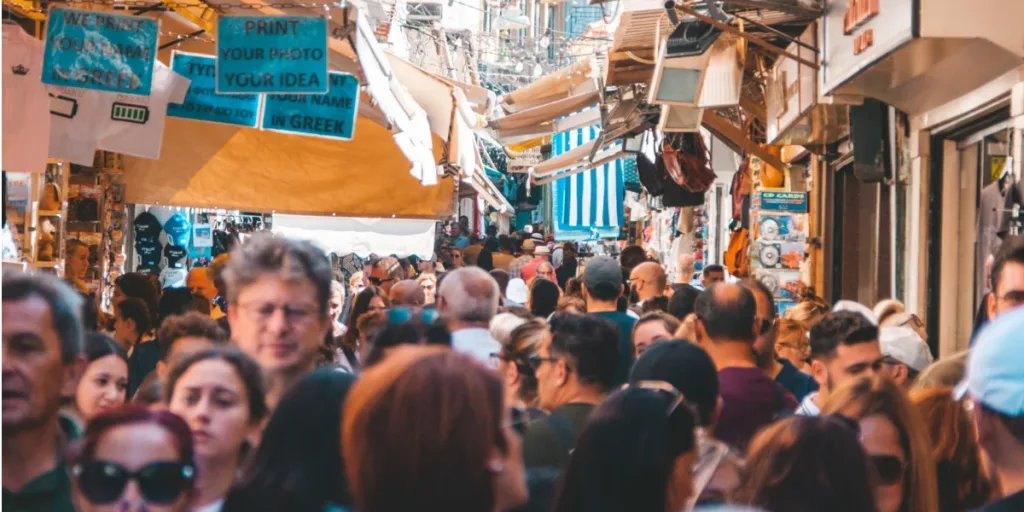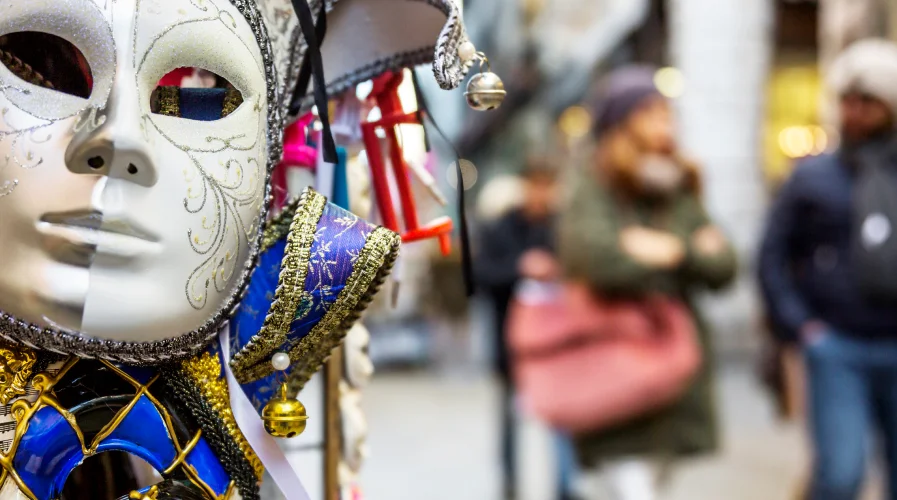Local parties in Athens and Greek

In Athens, there is a diverse array of festivities and traditions that take place throughout the year in the metropolis. In addition to these age-old commemorations, the city adorns itself to welcome a multitude of festivals, such as the Hellenic Festival or Athens Rockwave, among a wide selection of events.
- Athens and Epidaurus Festival
- The Athens Carnival
- Greek National Day: March 25th
- Orthodox Easter (Greek Easter)
- The Patras Carnival in Greece: A Celebration of Joy and Tradition
- The Grape Harvest Festival in Greece: Celebrating Winemaking Tradition and Autumn Culture
- Saint Demetrius Day: October 26th
- Christmas and New Year Celebrations
- Conclusion
Athens and Epidaurus Festival
The Athens and Epidaurus Festival stands as one of Greece’s most prominent and prestigious cultural events. Taking place during the summer months, it celebrates music, theater, and the arts in the historic and cultural settings of Athens and the ancient theater of Epidaurus. This festival attracts national and international artists as well as culture enthusiasts from around the world.
The Athens and Epidaurus Festival was established in 1955 as an initiative to revive ancient Greek theater and celebrate classical culture. Its founding mission was to showcase both ancient and modern theatrical works, as well as concerts and dance performances, in some of Greece’s most iconic locations. These include the Herodes Atticus Theater on the slopes of the Acropolis in Athens and the ancient theater of Epidaurus, renowned for its exceptional acoustics.
Program and Events
Ancient Greek Classics: The festival highlights ancient Greek theatrical works, including the tragedies of Aeschylus, Sophocles, and Euripides. These performances take place at the ancient theater of Epidaurus, where the acoustics and ambiance provide a unique theatrical experience.
Modern Theater Productions: In addition to the ancient works, contemporary Greek and international theater productions are showcased. These performances are often held at the Herodes Atticus Theater and other venues in Athens.
Concerts: The festival also features a series of concerts, including classical, popular, and contemporary music genres. Local and international artists perform on outdoor stages, creating a magical atmosphere.
Dance: Contemporary and classical dance performances are also an integral part of the festival, often staged at the Herodes Atticus Theater and other historic venues.
Special Events: Alongside regular performances, the festival may include special events, lectures, film screenings, and educational activities related to culture and the arts.
Cultural Significance
The Athens and Epidaurus Festival is not only an internationally renowned cultural event but also plays a crucial role in promoting and preserving Greece’s rich cultural heritage. Celebrating both classical and contemporary works in historic settings adds an extra layer of value to the artistic experience.
The Athens and Epidaurus Festival is a cultural celebration that combines ancient tradition with modern artistic expression in an exceptionally historic setting. It offers attendees the opportunity to immerse themselves in Greece’s rich cultural legacy while enjoying world-class performances. It is an event that draws culture and arts enthusiasts from around the globe, making a significant contribution to the promotion of Greek culture and its global influence.
The Athens Carnival
The Athens Carnival is one of the most prominent festivals in the Greek capital, celebrated with enthusiasm and delight in the city’s streets. This colorful and lively festivity marks the period leading up to Lent and provides Athenians and visitors alike with an opportunity to immerse themselves in Greek culture and tradition. Here is a comprehensive article about the Athens Carnival, its history, traditions, and celebrations.
Origins and Evolution
The Athens Carnival traces its roots to ancient pagan celebrations and festivities honoring the Greek god Dionysus, the god of wine and theater. Over the years, this celebration has evolved, blending traditional elements with Venetian and Ottoman influences due to Greece’s historical background. Today, the Athens Carnival is an iconic event that combines festivity and cultural tradition.
Duration and Celebrations
The duration of the Athens Carnival varies depending on the date of Orthodox Easter in a given year. Typically, it begins in early February and culminates on the weekend before the start of Lent. During this period, the city comes alive with exciting events and activities, including:
Carnival Parades: Carnival parades are the highlight of the celebration. Athens is filled with colorful floats, dance groups, and music bands parading through the city’s main streets. Participants don creative and elaborate costumes, and satire and humor often play a significant role in these parades.
Music and Dance: Music and dance are essential components of the Athens Carnival. Public squares and streets resonate with live music and traditional Greek dances, creating a festive and lively atmosphere.
Costume Contests: Costume contests are organized where participants compete for the most original and creative outfits. Winners receive awards in various categories, fostering creativity and artistic expression.
Parties and Cultural Events: In addition to parades and contests, the Athens Carnival offers a wide range of cultural events, including theater performances, art exhibitions, and live music presentations.
Cultural Significance
The Athens Carnival is a celebration that unites the community and reflects Greece’s rich cultural tradition. Through its music, dance, costumes, and cultural events, this festival showcases Greek culture’s ability to adapt and evolve while preserving its historical roots.
The Athens Carnival is a vibrant and colorful celebration that commemorates joy and Greek tradition. It is an event that combines fun and creativity with Greece’s rich history and culture, attracting both locals and visitors from around the world who seek to experience the magic of this unique carnival in the Greek capital.

Greek National Day: March 25th
The Greek National Day, known as “Independence Day” or “Greek Revolution Day,” is one of Greece’s most important and significant celebrations. It is observed on the 25th of March each year and commemorates the start of the Greek War of Independence in 1821 against the Ottoman Empire. This date provides an opportunity to pay tribute to national heroes and recall a pivotal period in Greece’s history.
In Athens, the capital of Greece, the festivities commence with a solemn ceremony at the Tomb of the Unknown Soldier, situated in Syntagma Square. Political and military leaders, along with a multitude of citizens, gather to pay homage to the fallen and place floral tributes at the monument.
Military parades are held in various parts of Greece, featuring the participation of the armed forces, the police, and various civilian organizations.
Schools also play a significant role in the celebration, with students taking part in school parades, showcasing traditional costumes and Greek flags.
Many buildings and streets are adorned with flags and flowers, and in some smaller towns, cultural events and exhibitions related to the history of Greek independence are organized.
Orthodox Easter (Greek Easter)
Orthodox Easter, also known as Greek Easter, is one of the most significant and cherished religious celebrations in Greece. It follows the Eastern Orthodox Church’s liturgical calendar and is observed to commemorate the crucifixion and resurrection of Jesus Christ. The date of Greek Easter varies each year according to the Julian calendar, which is still used by the Orthodox Church.
Preparation
The observance of Orthodox Easter begins with Great Lent, a 40-day period of fasting and reflection. During this time, Orthodox believers abstain from consuming meat, dairy products, and olive oil, among other dietary restrictions. Fasting is seen as a means of spiritual purification and preparation for the Easter celebration.
Greek Orthodox Easter Traditions
Greek Orthodox Easter is a time of profound religious devotion, marked by a series of rituals and customs that have been passed down through generations. Here is an overview of how Greek Easter is celebrated:
Palm Sunday (Kyriaki ton Vlachon): The Holy Week commences with Palm Sunday, during which people attend church services carrying olive branches or palm fronds to be blessed by the priest. These blessed branches are then taken home and placed as symbols of protection.
Holy Wednesday (Megalí Triti): On this day, the “Service of the Holy Unction” is held in church, during which the faithful are anointed with holy oil for healing and protection.
Holy Thursday (Megáli Pempti): Holy Thursday evening is marked by the “Last Supper” commemoration, symbolizing Jesus’s last meal with his disciples. A special liturgy is conducted in the church, followed by a procession carrying the Holy Sepulcher through the streets.
Good Friday (Megáli Paraskeví): Good Friday is the most solemn day of Holy Week, observing the crucifixion of Christ. Many people attend church to participate in the Passion liturgy. In the afternoon, the procession of the Holy Sepulcher takes place, a striking manifestation of faith with participants carrying lit candles.
Holy Saturday (Megáli Sávato): On Holy Saturday at midnight, the “Anástasis” or Resurrection of Christ is celebrated. The church is filled with light as worshipers light candles from the Holy Fire. Easter Sunday is marked by festive meals that typically include lamb and other traditional dishes, enjoyed in a spirit of joy and family togetherness.
Easter Sunday (Kyriakí tou Páscha): Easter Sunday is a joyful celebration that signifies the Resurrection of Christ. People greet each other with the phrase “Christ has risen!” and respond with “Truly, He has risen!” Festive meals, family gatherings, and the cracking of red-dyed eggs are integral to this day.
Greek Orthodox Easter is a unique and deeply spiritual experience that combines religious faith with rich cultural and culinary traditions. For Greeks, it is a time of profound spiritual significance and an opportunity for families and communities to come together. If you have the chance to witness Greek Easter, you will immerse yourself in a celebration filled with devotion and tradition deeply rooted in the country’s history.
The Patras Carnival in Greece: A Celebration of Joy and Tradition
The Patras Carnival, known as the “Carnival of Apokries,” is one of the most vibrant and anticipated events on the Greek festive calendar. This celebration takes place in the city of Patras, located in the Peloponnese region, and occurs during the weeks leading up to Lent, culminating in a crescendo of celebrations before the start of the Lenten fasting season. Below is a comprehensive report on the Patras Carnival, a celebration filled with color, music, and tradition.
Origins and History
The Patras Carnival has deep roots in Greek tradition and is believed to date back to ancient Greece. Over the centuries, it has evolved and been enriched by influences from Venetian and Ottoman cultures due to Patras’ strategic position in the Mediterranean. The festivity has survived even during times of occupation and conflicts, highlighting its cultural significance and local community roots.
Duration and Celebrations
The Patras Carnival’s duration varies, as it depends on the date of Easter in a given year. Typically, it begins in late January or early February and culminates on the weekend before the start of the Orthodox Lent. During this period, the city of Patras comes alive with a series of festive events and activities, including:
Parades: Carnival parades are the highlight of the celebration. The streets of Patras are filled with colorful floats, dance groups, musicians, and costumed participants parading along the carnival route. These parades are creative and often satirical, addressing current political and social themes.
Dancing and Music: The city’s streets and squares are filled with music and dance. Traditional Greek music and modern tunes resound throughout the city center, inviting people to join in the festivities with enthusiasm.
Costume Contests: Costume contests are an essential part of the Patras Carnival. Participants compete for the most creative and elaborate costumes, with prizes for winners in different categories.
Parties and Cultural Events: In addition to parades and contests, the carnival offers a wide range of cultural events, including theatrical performances, art exhibitions, and educational activities that highlight Greece’s rich history and traditions.
Cultural Significance
The Patras Carnival is a celebration that goes beyond momentary fun and joy. It is a living testament to Greek culture, its adaptability, and its ability to keep traditions alive over the centuries. The festivity fosters social cohesion and reinforces the sense of community and belonging among the people of Patras.
The Patras Carnival in Greece is a fascinating and colorful celebration that combines fun and tradition in an atmosphere of joy and revelry. It is an event that reflects Greece’s rich history and culture, attracting both locals and visitors from around the world who wish to experience the magic of this unique carnival in the Peloponnese.

The Grape Harvest Festival in Greece: Celebrating Winemaking Tradition and Autumn Culture
The Grape Harvest Festival in Greece is an annual celebration that pays homage to grape harvesting and wine production, marking the transition from the warm summer season to the cool and colorful autumn. This festival takes place in various wine regions across Greece during the months of September and October. Below, we present a comprehensive report on the Grape Harvest Festival in Greece, a celebration that combines winemaking tradition, culture, and the joy of autumn.
Origins and History
Wine has played a fundamental role in Greek culture for millennia, and grape harvesting has been an ingrained tradition since ancient times. The Grape Harvest Festival, although modern in its approach, finds its roots in these historical practices. It is a way to honor the importance of wine in Greek life and an opportunity for wine-producing communities to celebrate their hard work and share their products with the public.
Duration and Celebrations
The Grape Harvest Festival in Greece spans several weeks and may vary depending on the region and local festivities. Here is an overview of typical celebrations:
Grape Harvest: The grape harvest begins with the picking of ripe grapes in the vineyards. This process is a crucial part of the festival, and grapes are carefully selected to ensure wine quality.
Grape Stomping: One of the most iconic traditions of the harvest is grape stomping. People, often barefoot, participate in this ancient process, crushing grapes to extract the juice, symbolizing the community’s connection to the land and nature.
Wine Tastings: During the festival, wine tastings are organized in wineries and public squares. Visitors have the opportunity to sample a wide variety of local wines and learn about production methods.
Cultural Events: Alongside wine-related activities, the Grape Harvest Festival often includes cultural events such as live music, traditional dances, and theatrical performances that showcase the region’s cultural richness.
Parades and Local Celebrations
Some cities and regions hold parades and local celebrations, featuring decorated floats, traditional costumes, and festive music that parade through the streets.
Cultural Significance
The Grape Harvest Festival is an opportunity for wine-producing communities in Greece to showcase their pride in producing quality wine and share their cultural heritage with visitors and locals alike. Furthermore, it underscores the importance of wine in Greek culture and its role in the country’s gastronomy and social life.
The Grape Harvest Festival in Greece is a celebration that combines winemaking tradition with the cultural richness of the country, creating a festive atmosphere that celebrates the harvest and the arrival of autumn. It is a unique opportunity to experience Greek hospitality, taste exceptional wines, and immerse oneself in the rich winemaking tradition of the region.

Saint Demetrius Day: October 26th
October 26th marks Saint Demetrius Day in Greece, a religious and cultural celebration honoring Saint Demetrius of Thessaloniki, one of the most revered saints in the Eastern Orthodox Church and a significant figure in Greek history. This day provides an opportunity for Greeks to express their religious devotion and celebrate the memory of Saint Demetrius while also highlighting cultural and traditional aspects of the event. Below is a comprehensive article on Saint Demetrius Day in Greece.
The Life of Saint Demetrius
Saint Demetrius was born in Thessaloniki, which was then part of the Roman Empire, around 270 AD. He was a devout Christian who held a prominent position in the Roman army. However, when his Christian faith was discovered, he faced persecution and martyrdom. The most famous story associated with Saint Demetrius is his brave defense of Thessaloniki against Gothic invasions in 306 AD. During the battle, according to legend, Saint Demetrius intervened divinely to protect the city and defeat the invaders.
The Celebration of Saint Demetrius Day
Saint Demetrius Day is a significant holiday in Greece, especially in Thessaloniki, where his church and tomb are located. Celebrations include:
Religious Services: Eastern Orthodox churches hold special religious services in honor of Saint Demetrius. The faithful attend masses and liturgies where the life and miracles of the saint are read.
Procession: In Thessaloniki, a religious procession carries an image of Saint Demetrius through the city’s streets, with the participation of priests and devotees.
Local Festivities: In some areas of Greece, local festivals are organized, featuring music, traditional dances, food stalls, and cultural activities. These events showcase the richness of Greek culture and provide an opportunity for local communities to come together.
Iconography and Art: Saint Demetrius is one of the most depicted figures in Eastern Orthodox iconography. During the celebration, numerous artistic representations of the saint can be seen in churches and the homes of believers.
Cultural and Historical Significance
Saint Demetrius Day goes beyond its religious importance and plays a crucial role in Greek cultural identity. Saint Demetrius is considered the patron saint of Thessaloniki and a symbol of bravery and resilience. His legacy is deeply rooted in Greece’s history and its struggle for independence and Orthodox faith.
Saint Demetrius Day in Greece is a celebration that combines religious devotion with the preservation of cultural heritage and the country’s history. It is a day when Greeks come together to pay homage to one of their beloved saints and to remember his role in protecting and shaping the identity of Thessaloniki and Greece as a whole.
Christmas and New Year Celebrations
The holiday season in Athens, Greece, is a time of festive cheer, cultural richness, and heartwarming traditions. From the glittering lights of Christmas to the vibrant countdown to New Year’s Eve, the city comes alive with the spirit of celebration and togetherness. In this article, we’ll explore the joyous Christmas and New Year celebrations in Athens.
Christmas in Athens
Decorations and Lights: The holiday season officially begins in Athens with the lighting of the Christmas tree in Syntagma Square, the city’s central gathering point. The streets and squares of Athens are adorned with colorful lights, festive decorations, and Nativity scenes. The atmosphere is nothing short of enchanting.
Shopping and Markets: In the weeks leading up to Christmas, Athens hosts various Christmas markets and bazaars. The most famous of these is the Christmas Market at Syntagma Square, where visitors can find unique gifts, seasonal treats, and traditional crafts.
Caroling and Music: Carolers, often dressed in traditional Greek attire, roam the streets singing festive songs, and musical performances are held in various locations across the city. The sound of Christmas music fills the air, adding to the holiday spirit.
Christmas Eve: On Christmas Eve, many Athenians attend a late-night church service. Afterward, it’s customary to enjoy a festive meal with family and friends. A traditional Greek Christmas dinner often includes dishes like roast lamb, baklava, and special holiday bread called “Christopsomo.”
New Year’s Eve in Athens
Syntagma Square Countdown: The heart of the New Year’s Eve celebration in Athens is Syntagma Square. Thousands gather here to watch the countdown to midnight on the giant digital clock. As the clock strikes twelve, the night sky is illuminated by a breathtaking fireworks display, and people exchange New Year’s wishes and hugs.
Party All Night: Athens is known for its vibrant nightlife, and New Year’s Eve is no exception. The city’s bars, clubs, and restaurants host special events and parties that continue well into the early hours of the morning. Live music, dancing, and festive drinks are the order of the night.
First Footing: Similar to traditions in other countries, Greeks often believe that the first person to enter their home in the New Year brings good luck. It’s a custom for this person, known as the “protoskholias,” to carry symbolic gifts like coins and sweets.
New Year’s Day: New Year’s Day in Athens is typically a time for relaxation and reflection. Many Athenians take a leisurely stroll through the city’s parks or visit friends and family to exchange greetings and well-wishes for the year ahead.
The Christmas and New Year celebrations in Athens are a testament to the city’s festive spirit and the importance of family and community. Whether you’re exploring the beautifully adorned streets, attending a traditional church service, or joining the lively New Year’s Eve countdown in Syntagma Square, Athens offers a warm and welcoming atmosphere during this special season. It’s a time when the rich traditions of Greece blend seamlessly with the joyous spirit of the holidays, creating unforgettable memories for both locals and visitors alike.

Conclusion
Athens, the cradle of Western civilization, is not only steeped in history and ancient wonders but also a vibrant and dynamic modern city that cherishes its cultural heritage. The celebrations mentioned here represent just a glimpse into the diverse tapestry of cultural events that Athens hosts year-round. From the timeless allure of the Acropolis to the lively rhythms of its festivals and the warmth of its people, Athens is a city that embraces its past while forging ahead into the future. For those who seek to immerse themselves in the heart of Greek culture and tradition, Athens stands as an inviting and ever-enticing destination, where every visit promises to be a journey through time and a celebration of life.









